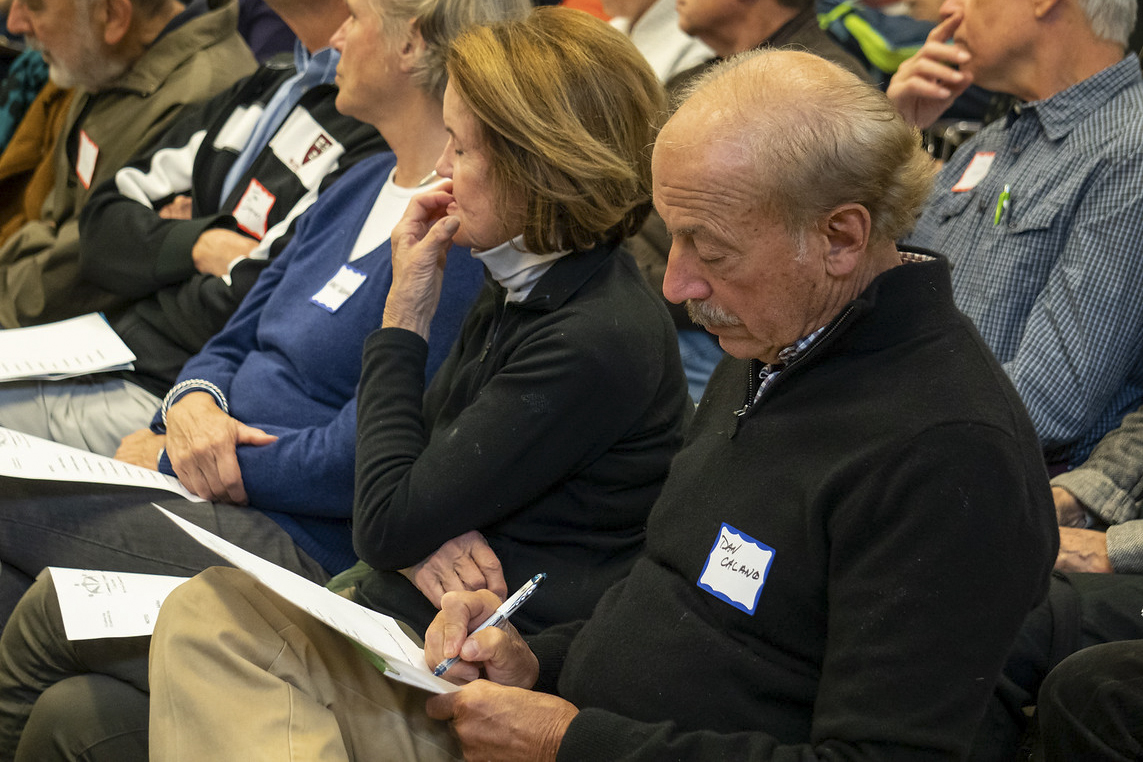
News
Summers Will Not Finish Semester of Teaching as Harvard Investigates Epstein Ties

News
Harvard College Students Report Favoring Divestment from Israel in HUA Survey

News
‘He Should Resign’: Harvard Undergrads Take Hard Line Against Summers Over Epstein Scandal

News
Harvard To Launch New Investigation Into Epstein’s Ties to Summers, Other University Affiliates

News
Harvard Students To Vote on Divestment From Israel in Inaugural HUA Election Survey
Cambridge City Council Candidates Return to Affordable Housing Debate at Forum

Ten of 22 candidates for Cambridge City Council made their case to voters Sunday night at an open forum, discussing issues from affordable housing to the state of businesses in Harvard Square.
The forum, held at Lesley University, was sponsored by the Cambridge Citizens Coalition and was the third candidate forum in the past several weeks.
Keeping in line with the most recent forum directly related to environmental issues, many candidates spoke about climate change, and how the city can reduce its impact. Candidate Nicola A. Williams said she believes any new building in Cambridge should have to be certified as a net zero emissions project. Candidate Patricia M. “Patty” Nolan ’80 addressed the city’s ongoing issue with the loss of its tree canopy, arguing that its continued degradation presents a “real danger” to residents.
“For us to pretend that trees are not as important as people that is a false dichotomy, because everybody needs trees,” she said.
Candidates also touched on the state of Harvard Square, which has recently seen a number of closures. Williams called the area “pathetic,” citing constant construction and high vacancy rates. She did, however, say that she has worked with the neighborhood association to address the issue.
“There is hope folks, I’m part of the neighborhood association, we got together and did planning the right way,” she said, citing recent efforts to address the Square’s issues.
Some challengers also criticized current councilors — two of whom attended Sunday evening — for how they have chosen to address challenges across the city. Candidate John Pitkin said the city council cannot “micromanage” every issue affecting Cambridge residents, and called for the city to work more closely with neighborhood associations.
“They’re essential conduits of information from people to our government,” Pitkin said.

The candidates also addressed affordable housing in Cambridge, focusing on the contentious affordable housing overlay, which has been hotly debated since it was introduced in March. The proposed zoning reform seeks to incentivize developers to build affordable housing units in Cambridge by streamlining approvals processes and reducing costs.
In a September meeting, the city council unanimously voted to table the proposal until the next council could address it after it became clear that it would not have enough votes to pass the measure.
Charles J. Franklin said that though he supported the idea of an overlay, he did not approve of the city’s proposal.
“The thing that really killed it was that the city did not respect existing neighborhoods and neighbors when they came up with this plan,” he said. “It's the same theme of city doing what they want and alienating people.”
City councilor and candidate Craig A. Kelley, who opposed the overlay in the council, reiterated his stance at the forum, saying the plan would have done “basically nothing” to increase the supply of affordable housing. With a one vote margin of defeat in the current council, he said, the elections could decide whether it passes the council.
“I would like it fixed before we decide to move forward with it if we ever do,” he said. “Make no mistake, this next election is a referendum on the affordable housing overlay.”
— Declan J. Knieriem can be reached at declan.knieriem@thecrimson.com. Follow him on Twitter at @DeclanKnieriem.
Want to keep up with breaking news? Subscribe to our email newsletter.
